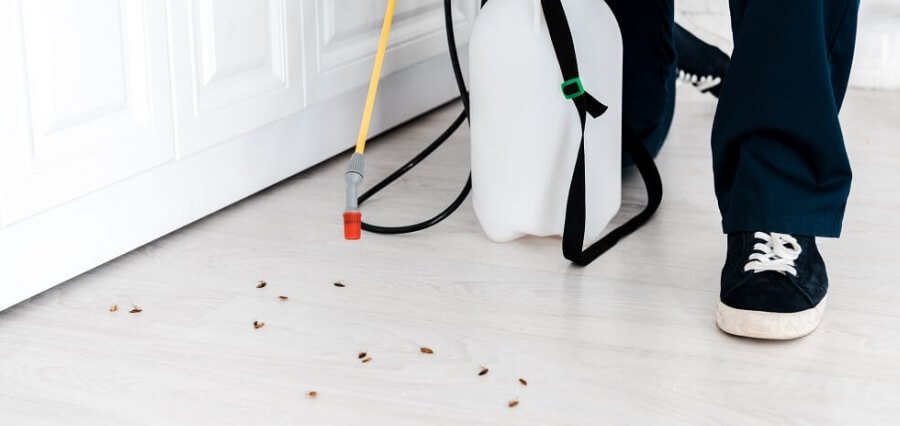Comprehending the Various Techniques to Parasite Control: A Comprehensive Guide

All-natural Insect Control Approaches
Employing environment-friendly methods such as buddy growing and organic insect control is vital for effectively taking care of parasites in agricultural setups. Friend planting entails growing various crops in proximity to discourage insects, boost nutrient uptake, and enhance total plant health. Growing marigolds together with tomatoes can help fend off nematodes. Intercropping maize with legumes can interfere with the reproduction patterns of insects like corn borers.
Organic insect control entails introducing all-natural predators or virus to control pest populaces. Ladybugs, for instance, prey on aphids, controlling their numbers without the demand for chemical pesticides. Another instance is the use of Bacillus thuringiensis (Bt), a germs that targets specific insect bugs while being safe to people, pets, and advantageous pests.
These environmentally friendly approaches not only lower the reliance on artificial chemicals but likewise help protect biodiversity and dirt health. By integrating all-natural bug control strategies into farming methods, farmers can attain sustainable parasite management while decreasing negative influences on the environment.

Chemical Parasite Control Solutions
In addition to natural insect control approaches, the application of chemical pest control options plays a substantial role in successfully managing pest populations in farming atmospheres. Chemical parasite control services are created to target details pests that may cause substantial damage to plants. These solutions often consist of synthetic pesticides that are developed to get rid of parasites promptly and successfully.
Among the vital benefits of chemical bug control options is their efficiency in managing insect invasions on a big scale. Farmers can use these remedies making use of different techniques such as spraying, airing out, or seed therapy to secure their crops from hazardous insects, weeds, and conditions. In addition, chemical bug control services are relatively very easy to use and can offer rapid outcomes, assisting farmers protect their yields and decrease financial losses.
Nonetheless, it is necessary to utilize chemical parasite control options judiciously to decrease prospective negative effects on the environment, non-target microorganisms, and human health. Correct application techniques, adherence to security guidelines, and normal monitoring are vital to guarantee the liable use of chemical bug control solutions in agricultural techniques.
Biological Insect Control Approaches
Organic pest control approaches leverage natural predators or microorganisms to take care of parasite populations in agricultural settings successfully. One usual biological control method is the introduction of all-natural adversaries, such as ladybugs or parasitic wasps, to target particular bugs.
An additional organic control method involves using microorganisms like fungis, microorganisms, or infections to infect and kill pests. These microbial agents can be sprayed on plants or presented right into the soil to combat various parasites without damaging beneficial pests or various other wildlife. Additionally, using scents to interrupt the mating patterns of insects is another reliable organic control technique. By disrupting their recreation, this technique helps to lower bug populations without the demand for chemical intervention. In general, organic bug control approaches supply a lasting and targeted solution to pest monitoring in agriculture.
Integrated Parasite Monitoring (IPM)
Integrated Insect Monitoring (IPM) is why not try these out a detailed approach that integrates numerous pest control techniques to effectively handle and decrease pest populations in agricultural systems. IPM concentrates on lasting avoidance of insects with a mix of organic, cultural, physical, and chemical control methods. By integrating these various strategies, IPM aims to decrease reliance on chemical pesticides, lessen ecological impact, and promote sustainable bug monitoring practices.
One key element of IPM is the usage of organic controls such as all-natural killers, parasites, and pathogens to regulate insect populations. This technique takes this advantage of the power of nature to keep an equilibrium in between pests and their natural enemies without causing harm to the environment.
Additionally, IPM includes cultural practices like crop rotation, habitat, and sanitation adjustment to develop negative problems for bugs and disrupt their life cycles. Physical controls such as barriers, mulches, and catches are additionally made use of to stop pest invasions.
Mechanical and Physical Insect Control Techniques
Using non-chemical techniques, such as physical and mechanical bug control techniques, is an important element of extensive insect management methods, building upon the foundation of Integrated Insect Administration's holistic strategy. Mechanical insect control involves making use of physical obstacles or traps to avoid pests from accessing and damaging plants or frameworks. This technique can include methods like mounting screens on windows, utilizing row covers in farming, or employing sticky catches to capture insects.
Physical pest control approaches, on the other hand, concentrate on straight eliminating parasites through physical methods. For instance, making use of heat therapies to eliminate bed pests or vacuuming up pests like ants or crawlers can be efficient means to manage invasions without the usage of chemicals. By integrating these physical and mechanical pest control methods right into an Integrated Pest Administration strategy, experts and people can lower reliance on pesticides while still successfully taking care of pest populations and lessening damage.
Final Thought

In addition to all-natural bug control methods, the application of chemical bug control options plays a considerable role in effectively managing pest populations in agricultural atmospheres.One of the key advantages of chemical insect control services is their more info here efficiency in controlling insect infestations on a large range.Integrated Bug Management (IPM) is a comprehensive approach that incorporates different pest control methods to efficiently handle and minimize pest populations in farming systems.Utilizing non-chemical techniques, such as physical and mechanical insect control methods, is an important facet of comprehensive bug monitoring strategies, developing upon the structure of Integrated Parasite Management's alternative strategy. By incorporating these mechanical and physical bug control strategies right into an Integrated Pest Administration strategy, professionals and individuals can decrease dependence on chemicals while still properly lessening and taking care of pest populaces damages.
 Tia Carrere Then & Now!
Tia Carrere Then & Now! Michael J. Fox Then & Now!
Michael J. Fox Then & Now! Molly Ringwald Then & Now!
Molly Ringwald Then & Now! Talia Balsam Then & Now!
Talia Balsam Then & Now! Nadia Bjorlin Then & Now!
Nadia Bjorlin Then & Now!